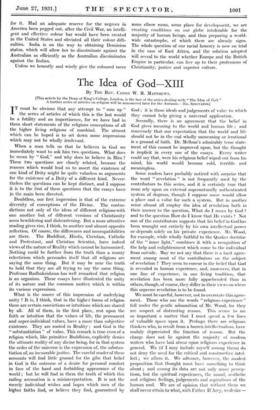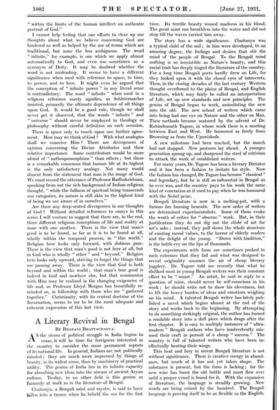The Idea of God XIII
By THE REV. CANON W. R. MATTHEWS.
[This article by the Dean of King's College, London, is the last of the series dealing with " The Idea of God." A further series of articles on religion will be announced later for the Autumn.—En. BracraToa]
IT must be obvious that any attempt to " sum up " the series of articles of which this is the last would be a futility and an impertinence, for we have had in them short statements of the religious conceptions of all the higher living religions of mankind. The utmost which can be hoped is to set down some impressions which may not be wholly irrelevant.
When a man tells us that he believes in God we immediately want to ask him two questions. What does he mean by " God," and why does he believe in Him ? These two questions are closely related, because the reasons which would lead us to assert the existence of one kind of Deity might be quite valueless as arguments for the existence of a Deity of a different kind. Never- theless the questions can be kept distinct, and I suppose it is to the first of these questions that the essays have in the main been directed.
Doubtless, our first impression is that of the extreme diversity of conceptions of the Divine. The contra- dictions not only of the ideas of different religions with one another but of different versions of Christianity seem bewildering and disheartening. But a more attentive reading gives rise, I think, to, another and almost opposite reflection. Of course, the differences and incompatibilities are there.. The Buddhist, Hindu, Christian, Catholic and Protestant, and Christian Scientist, have indeed views of the nature of Reality which cannot be harmonized. Nothing could be further from the truth than a muzzy eclecticism which persuades itself that all religions are saying the same thing. But it may be near the truth to hold that they are all trying to say the same thing. Professor Radhakrisiman has well remarked that religion is an organism. These essays have illustrated the unity of its nature and the common motive which is within its various expressions.
What is the source of this impression of underlying unity ? It is, I think, that in the higher forms of religion there are certain convictions or intuitions which are shared by all. All of them, in the first place, rest upon the faith or intuition that the values of life, the permanent and super-individual values, have a more than subjective existence. They are rooted in Reality ; and God is the " substantiation " of value. This remark is true even of a religion which, like primitive Buddhism, explicitly denies the ultimate reality of any divine being, for in that system the order of the universe is the expression of, the substan- tiation of, an inexorable justice. The careful reader of these accounts will find little ground for the gibe that belief in God is the outcome of a desire for personal comfort in face of the hard and forbidding appearance of the world ; but he will find in them the truth of which this railing accusation is a misinterpretation. It is not the merely individual wishes and hopes which men of the higher faiths find, or believe they find, guaranteed by God ; it is those ideals and judgements of value to which they cannot help giving a universal application.
Secondly, there is an agreement that the belief in God gives meaning to the world and human life ; and conversely that our expectation that the world and life should not be in the end wholly unmeaning or irrational is a ground of faith. Dr. Mellone's admirably terse state- ment of this cannot be improved upon, but the thought is implicit in every one of the essays. Every writer could say that, were his religious belief wiped out from his mind, his world would become cold, terrible and meaningless.
Some readers have probably noticed with surprise that the word " revelation " is not frequently used by the contributors to this series, and it is certainly true that none rely upon an external supernaturally 'authenticated system of dogmas, though I suppose some would allow a place and a value for such a system. But in another sense almost all employ the idea of revelation both 'in their answer to the question, What do I mean by God ? and to the question How do I know that He exists ? Not one of the contributors suggests that his belief in God has been wrought out entirely by his own intellectual power or depends solely on his private experience. Mr. Wood, for example, while wholly faithful to the Quaker doctrine of the " inner light," combines it with a recognition of the help and enlightenment which come to the individual from outside. May we not say that there is a tacit agree- ment among most of the contributors on the subject of revelation ? They seem to concur in the belief that God is revealed in human experience, and, moreover, that in one line of experience, in one living tradition, that revelation has been more fully apprehended than in others, though, of course, they differ in their views on where this supreme revelation is to be found.
We must be careful, however, not to overstate this agree- ment. Those who use the words "religious experience" fall under the gentle admonition of Mr. Wood, for they are suspect of distrusting reason. This seems to me so important a matter that I must spend a few lines of valuable space upon it. Perhaps there are religious thinkers who, in revolt from a barren intellectualism, have unduly depreciated the function of reason. But the charge does not lie against the majority of modern writers who have laid stress upon religious experience in general. We (if I may include myself among them) do not deny the need for the critical and constructive intel- lect ; we affirm it. We advance, however, the modest proposition that thought must have something to think about ; and among its data are not only sense percep- tions, but the spiritual experiences, the moral, aesthetic and religious feelings, judgements and aspirations of the human soul. We are of opinion that without them we shall never attain to what, with Father D'Arcy, we desire- " within the limits of the human intellect an authentic portrait of God."
I cannot help feeling that our efforts to clear up our thoughts about what we believe concerning God are hindered as well as helped by the use of terms which are traditional, but none the less ambiguous. The word " infinite," for example, is one which we apply almost automatically to God, and even use sometimes as a synonym of Deity. It may be doubted whether the word is not misleading. It seems to have a different significance when used with reference to space, to time, to power, and to love. It might even be argued that the conception of " infinite power " in any literal sense is contradictory. The word " infinite " when used in a religious reference surely signifies, as Schleiermacher insisted, primarily the ultimate dependence of all things upon God. It would be a good rule, though we shall never get it observed, that the words " infinite " and " universe " should never be employed in theology or philosophy without careful definition on each occasion.
There is space only to touch upon one further agree- ment. How may we think of God ? With what analogies shall we conceive Him ? There are divergences of opinion concerning the Divine Attributes and their relative importance. Some contributors would be more afraid of " anthropomorphism " than others ; but there is a remarkable consensus that human life at its highest is the only satisfactory analogy. Not many would dissent from the statement that man is the image of God. We must record the utterance of Professor Radliakrishnan, speaking from out the rich background of Indian religious thought, " while the fullness of spiritual being transcends our categories, its nature is still akin to the highest kind of being we are aware of in ourselves."
Are there any deep-seated divergences in our thoughts of God ? Without detailed references to essays in this series I will venture to suggest that there are, in the end, three different religious conceptions of life and reality at issue with one another. There is the view that man's good is to be found, so far as it is to be found at all, wholly within the temporal process, in " this world." Religion here looks only forward, with dubious gaze. There is the view that man's good is not here at all, but in God who is wholly " other " and " beyond." Religion here looks only upward, striving to forget the things that are passing away. There is the view that God is both beyond and within the world ; that man's true good is indeed in God and nowhere else, but that communion with Him may be realized in the changing exigencies of life and, as Professor Lloyd Morgan has beautifully re- minded us, in fellowship with those who are " gathered together." Christianity, with its central doctrine of the Incarnation, seems to me to be the most adequate and coherent expression of this last view.







































 Previous page
Previous page